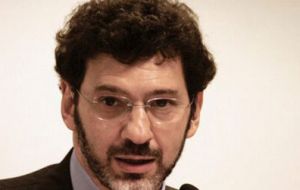MercoPress. South Atlantic News Agency
Falklands: Argentine professor visits Stanley and offers proposal to “end the dispute”
 According to Mr Kohen 20 point proposal, residents would be given dual Argentine/British nationality.
According to Mr Kohen 20 point proposal, residents would be given dual Argentine/British nationality. Argentine Professor of International Law at the Graduate Institute of International and Development Studies of Geneva, Marcelo Kohen, has studied disputes and resolutions in different parts of the world. Last Monday Kohen was in the Falkland Islands and at a public meeting in Stanley, he presented a proposal to put “an end to the dispute”.
Eight members of the public attended the meeting including two members of the local press.
Mr Kohen’s solution entailed a 20 point proposal for the Falkland Islands, South Georgia and the South Sandwich Islands.
The Islands would become a self-governing province of Argentina, with the electorate electing a Governor and Assembly. The judiciary would be independent. He said many aspects of life would remain the same - tax, customs, currency, language, ordinances,
and the federal government would not interfere with the province.
According to Mr Kohen, residents would be given dual Argentine/British nationality.
People born subsequently in the Falklands would receive dual nationalities. The UK would have a presence in the Islands. Two countries, such as Canada and Brazil, would act as guarantors.
After three years, the Islands would be demilitarized, with a provincial militia replacing current troops.
After 30 years, the assembly could hold a referendum to decide whether to continue with the experiment. If no agreement could be reached on the future status of the islands, then the case would be taken to the International Courts of Justice.
Mr Kohen told the audience that he would be presenting the same proposal next week in
Buenos Aires to congress members.
He had offered to discuss the proposal with MLAs, but he received a reply suggesting they felt it would be a waste of time.
Likewise audience members suggested building confidence would be difficult, given the history of relationships with the Argentine government. One aspect that might show Islanders that Argentina had good intentions would be to change its Constitution to remove the claim over the Islands. It was pointed out that such a move had helped relations between Northern Ireland and the Republic.
Mr. Kohen was told it was the 5th Anniversary of the Referendum when 99.8% of the voters voted in favour of maintaining our status as a British Overseas Territory. But Mr. Kohen dismissed the referendum as not valid, as it wasn't organized by the UN. (Penguin News)




Top Comments
Disclaimer & comment rules-

-

-

Read all comments”When someone has a problem, he or she can adopt three attitudes:
Mar 17th, 2018 - 11:01 pm +121) to deny it,
2) to accommodate to it and to live with it, or
3) to try to solve it.
I suggested the third option.”
And which attitude has Argentina taken, Mr Cohen?
Because it hides behind a facade of the third option of trying to solve it but its main thrust is the first option of denying certain facts of history, identity and expression of rights.
Argentina (and that includes which ever government is in power as well as many of its citizens) refuse to accept that there is such a thing as a Falkland Islander and then further refuses to accept that they have certain rights.
So I am unsure how your “plan”, and I deliberately use quotes here because the whole thing is slight half-arsed, can possibly work when the two most important bases of it require the recognition of a unique Falkland Islander identity (separate to an Argentinean and even a British identity) and their ability to legally express their rights.
The words and actions of your past and present governments and “academics” and many of your citizens give lie to Argentina being able to accept both these hard truths.
You have to wonder how a “valid” referendum could possibly be organised in your utopian future when it could so easily be dismissed as irrelevant or invalid because it didn't meet some legitimacy test set by a future Argentina.
If you truly believe that only the UN can organise legitimate referenda, then how does this marry with the reality they refuse to do such a thing? A referendum is an expression of rights by a group of people but where are their rights when referenda are withheld?
All you have done is offer to solve an Argentinean problem and not a problem of the Falkland Islands. In typical Argentinean academic fashion, you have entirely failed to take into account the actual people involved or affected by your top-down solution.
I was having dinner with business partners in the restaurant of a hotel last night and he walked into the bar area. He seemed really lost (he thinks he's in the Malvinas for a start) and looked around and left again. There were loads of Argentines there and not a single one acknowledged him.
Mar 17th, 2018 - 09:02 am +11The arrogance of the man.
Mar 17th, 2018 - 09:24 am +11Holds a meeting on the 5th anniversary of the Falklands Referendum and then tries to claim that the Referendum was irrelevant because it was not organised by the United Nations. Risible nonsense. The UN does not claim that it must organise a plebiscite. Res 637 of 1952 merely says that UN 'auspices' would be 'preferable'. Kohen knows this of course, but it doesn't suit his purpose, so - as lawyers do - he dissembles.
Previously he's even argued that the independent observers were not independent.
It seems likely that Kohen has gone mad.
I don't know whether to pity him, or laugh at him.
Commenting for this story is now closed.
If you have a Facebook account, become a fan and comment on our Facebook Page!